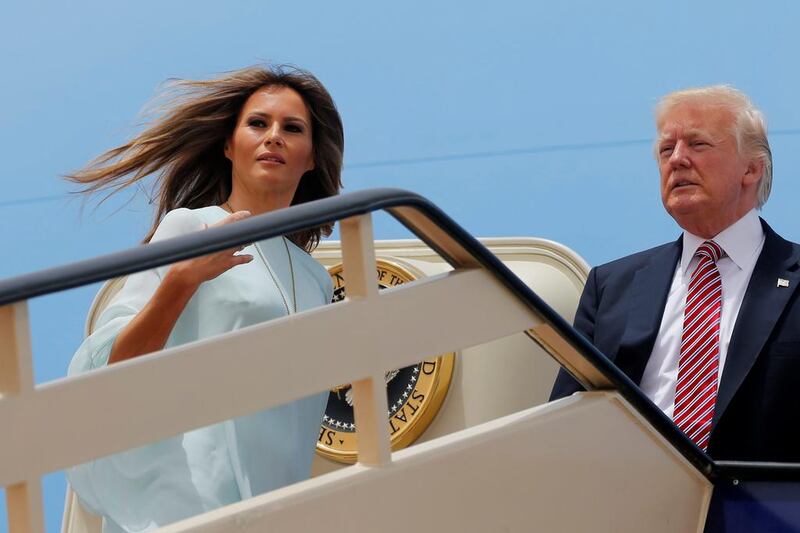It’s no secret that the US-Saudi strategic partnership was badly damaged during the Obama years. But the extent of the damage seems to elude so many on the progressive side in the United States. In that context, the reaction of the American press to Donald Trump’s visit to Saudi Arabia has been telling.
The first reports by the US media ranged from mocking his participation in the ardha dance to claims of it being un-American. But the ardha is a revered tradition among the tribes of the Arabian Peninsula.
Those who took aim at Mr Trump were taking a historically uninformed position when it comes to the power of personal diplomacy in the Gulf. Any reading of Arabian culture will demonstrate that personal connections always define relationships.
Decades ago, Franklin D Roosevelt, the 32nd US president, and Abdulaziz bin Saud, the founder of the modern kingdom, first explored the US-Saudi alliance. But it was the following interaction in 1945 – retrieved from the archives of Americans for Middle East Understanding and recorded in its publication The Link – that cemented a tie that would define that alliance: “Once the king was safely aboard the Quincy [an American warship], he and Roosevelt almost immediately struck a personal rapport by focusing on what they had in common rather than on their obvious differences.
“As recounted by Eddy, who was the interpreter for both sides, the king spoke of being the 'twin' brother of the president, in years, in responsibility as chief of state and in physical disability.
“The president said, 'but you are fortunate to still have the use of your legs to take you wherever you choose to go.'
“The king replied, 'It is you, Mr President, who are fortunate. My legs grow feebler every year; with your more reliable wheelchair you are assured that you will arrive.'
“The president then said, 'I have two of these chairs, which are also twins. Would you accept one as a personal gift from me?'
“The king said, 'Gratefully. I shall use it daily and always recall affectionately the giver, my great and good friend’."
Many publications criticised Barack Obama for being aloof. There are many reasons to criticise Mr Trump, but damning his eagerness to engage in personal gestures after eviscerating his predecessor for shying away from the same things is the textbook definition of hypocrisy.
What's so progressive about bashing everything that the Trump administration has done to reassure Saudi Arabia of the commitment of the US to its traditional partner and old friend? What's wrong with rebuilding trust among the Gulf states, especially after the Obama administration's boundless embrace of Iran? The reassurance was sorely needed. Trump delivered.
For the first time in many years, America’s allies in the Gulf have heard a realistic take on the threats to the region as embodied by the exchange that ended a joint press briefing by Adel Al Jubeir, Saudi Arabia’s foreign minister, and Rex Tillerson, US secretary of state, when the latter made a comment about this week’s presidential election in Iran: “What I would hope, is that Rouhani now has a new term and that he uses that term to begin a process of dismantling Iran's network of terrorism, dismantling its financing of the terrorist network, dismantling the manning and the logistics and everything that they provide to these destabilising forces that exist in this region.
“We also hope that he puts an end to their ballistic missile testing. We also hope that he restores the rights of Iranians to freedom of speech, to freedom of organisation so that Iranians can live the life that they deserve. That's what we hope this election will bring.
“I’m not going to comment on my expectation, but we hope, if [Mr] Rouhani wanted to change Iran's relationship with the rest of the world, those are the things he could do.”
Mr Al Jubeir replied: “As a sign of how truly strategic our partnership is, I agree with what Rex said.”
The following day, Mr Trump articulated a nascent version of what may evolve into a plausible Trump Doctrine by saying that “we are adopting a principled realism, rooted in common values and shared interests”.
And that is what matters to strategic bilateral relationships. These are the hugely consequential issues that need to be at the heart of any meaningful coverage of this president's journey. Instead, we got a steady stream of coverage about who is bowing to whom and who is dancing with whom.
It was wrong when this was the main form of criticism volleyed against Mr Obama by the conservative press and it’s wrong to now see it mobilised by the liberal press against Mr Trump. If the American press is going to play a proper role in advancing public discourse, we need to hear a lot more about policy.
Liberal commentaries can be every bit as parochial as their conservative counterparts. And that sort of commentary is not just unacceptable, it's dangerous.
The US-Saudi relationship should be a model. The example of two nations who are so different from one another forging an enduring partnership – one based in mutual respect and strategic reality – is not one to be derided. It's the only model that will work in the future as the countries and cultures of the world are bound together in ways that we have never seen before.
Mohammed Fairouz is an Emirati composer





